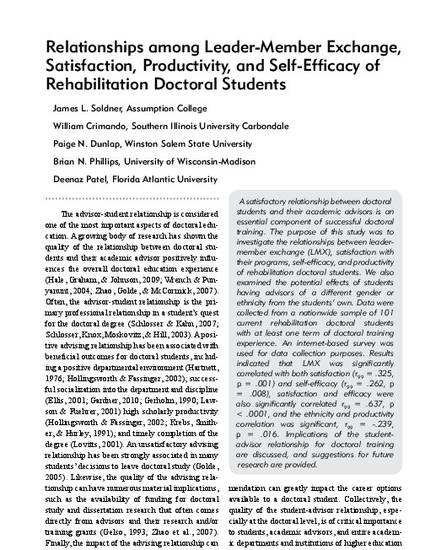
Article
Relationships among leader-member exchange, satisfaction, productivity, and self-efficacy of rehabilitation doctoral students
Rehabilitation Counselors and Educators Journal
(2012)
Abstract
A satisfactory relationship between doctoral
students and their academic advisors is an
essential component of successful doctoral
training. The purpose of this study was to
investigate the relationships between leadermember
exchange (LMX), satisfaction with
their programs, self-efficacy, and productivity
of rehabilitation doctoral students. We also
examined the potential effects of students
having advisors of a different gender or
ethnicity from the students’ own. Data were
collected from a nationwide sample of 101
current rehabilitation doctoral students
with at least one term of doctoral training
experience. An internet-based survey was
used for data collection purposes. Results
indicated that LMX was significantly
correlated with both satisfaction (r99 = .325,
p = .001) and self-efficacy (r99 = .262, p
= .008), satisfaction and efficacy were
also significantly correlated r99 = .637, p
< .0001, and the ethnicity and productivity
correlation was significant, r99 = -.239,
p = .016. Implications of the studentadvisor
relationship for doctoral training
are discussed, and suggestions for future
research are provided.
Keywords
- Leader=member exchange,
- rehabilitation counseling doctoral student
Disciplines
Publication Date
Winter 2012
Citation Information
James L. Soldner. "Relationships among leader-member exchange, satisfaction, productivity, and self-efficacy of rehabilitation doctoral students" Rehabilitation Counselors and Educators Journal (2012) Available at: http://works.bepress.com/james_soldner/18/
